ProductPayPalInnovationBusiness LendingResearch and Insights
When the COVID-19 pandemic began, Jennifer Vaughan noticed a change in her business’s customer base. Typically, her high-end paper store, Mulberry Paper and More, had appealed to professional artists, but increasingly amateurs were purchasing paper for crafts at home.
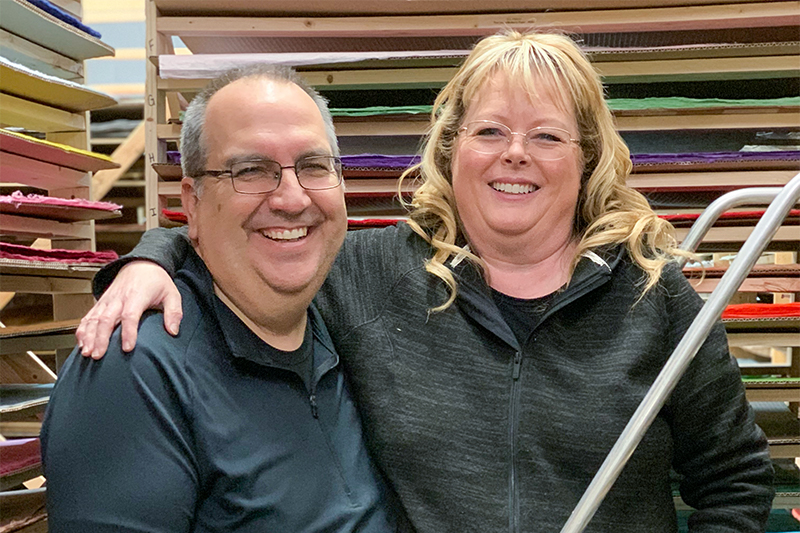
Jennifer Vaughan and her husband in Mulberry Paper and More’s stock room.
It’s a trend seen across the craft industry. With people spending more free time at home over the past year, many consumers have taken up creative pandemic hobbies, increasing sales for a variety of established craft businesses and even driving some amateur hobbyists to turn their craft making into a successful small business. Consumers have turned to crafts as they search for creative ways to bond, spruce up their homes, do school art projects, or even relax and relieve stress.
Pinterest searches for “art therapy activities” were up 444% in 2020 from 2019, and searches for “thrift store crafts” were up 2276%, according to the company’s 2020 trends report. Consumers are taking up all sorts of other crafts too, ranging from Origami to embroidery, and the internet has made it easy for buyers and sellers to find, buy or market goods through websites and social media. Below, three businesses share their insights about this trend.
Parents turn to Origami to keep kids crafting
Jennifer Vaughan, the owner of Mulberry Paper and More, thinks the recent change in her customer base has been due to two factors: a pause in gallery and art shows during the pandemic that has resulted in professional artists buying less high-end paper, and a growing interest in casual crafting as people have had more time on their hands.
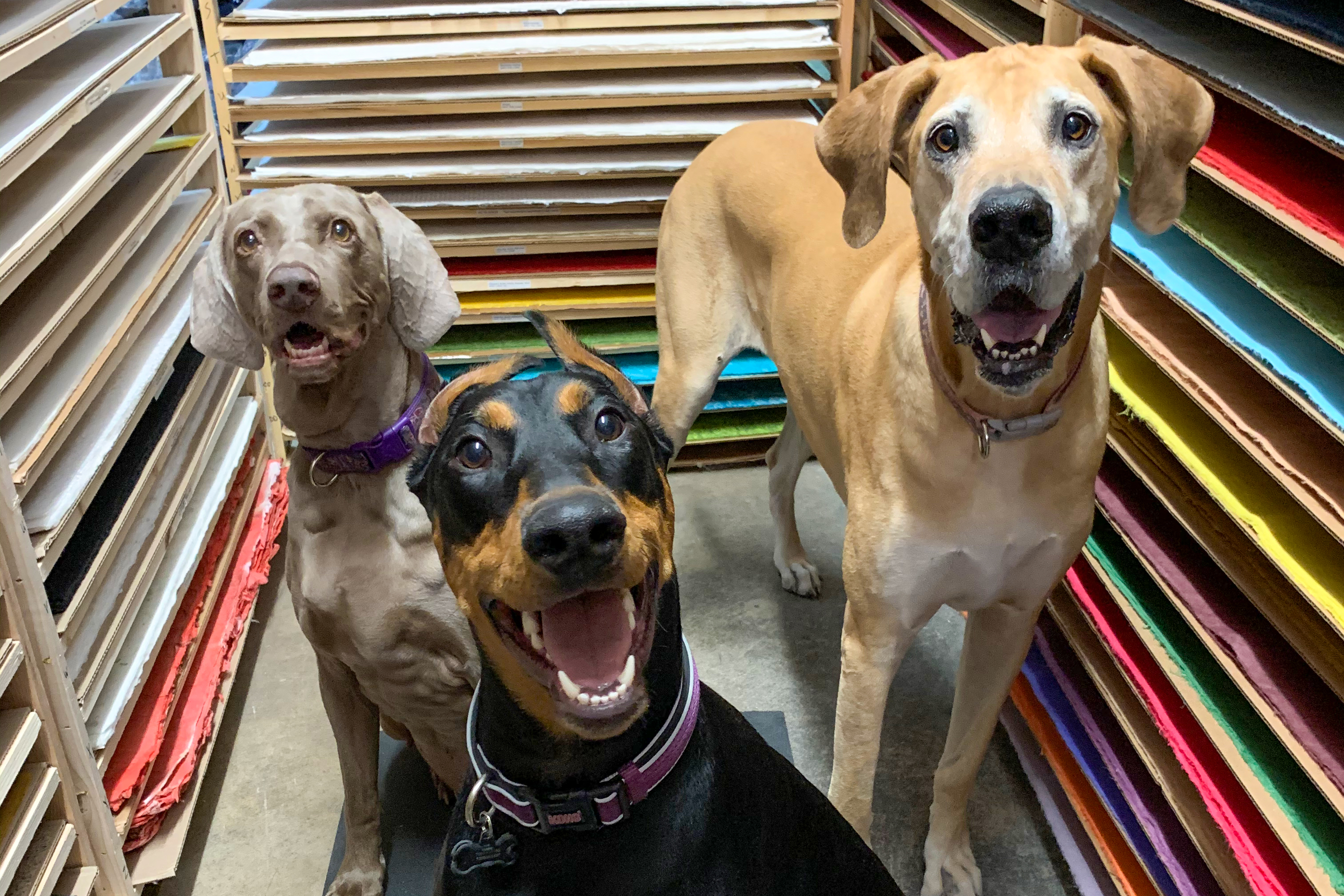
Jennifer’s three dogs enjoy visiting Mulberry Paper and More’s warehouse.
But the shift hasn’t come without challenges. One of Mulberry Paper and More’s largest suppliers closed temporarily in March of 2020. “We had to think quickly to get merchandise back in stock,” Jennifer said. She began to look internationally for new vendors, and now the store imports paper from Mexico, Italy, Thailand and South Korea. Using PayPal for some of those purchases made it easier to transact. “We use PayPal to help pay our vendors in Mexico and Italy,” Jennifer said. “It’s great for international purchases.”
On the online-only store’s website, Jennifer created a Paper Idea Gallery that showcases customers’ creative projects using Mulberry Paper and More’s products. The Gallery inspires new and existing customers to attempt new crafts.
Customers whose images appear in the Gallery receive a coupon code in return, and Jennifer links to their websites or stores in each post. “The website gallery just took off,” she said.
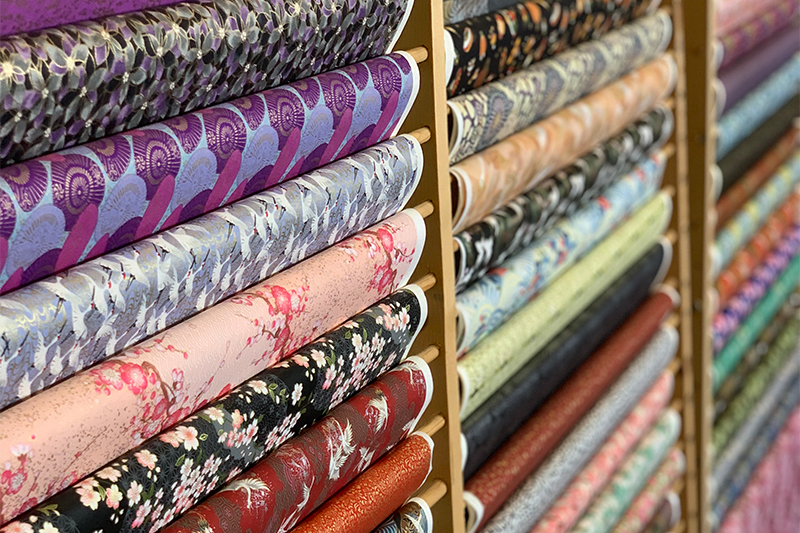
Mulberry Paper and More sells a variety of paper products.
Mulberry Paper and More saw a 40% increase in sales in 2020, and Jennifer expects continued growth. The most popular product? Origami paper. “Kids are home, and parents are looking to involve their children in something that does not require a screen,” she said, calling Origami an “ideal pandemic activity” that she thinks children excel at more than adults because children “have more patience.”
After the pandemic eases, she’s eager to visit some of her international suppliers in person. “I work directly with the artisans in Mexico who make our amate paper,” she said. “I would like to visit them in person to share how their paper has helped us be successful.”
Building a business and online communities around a passion for glitter
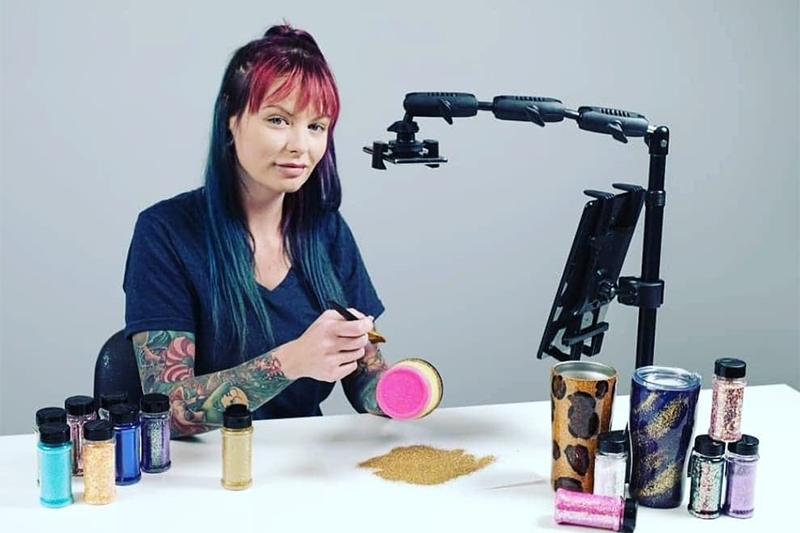
Sara Lively shares how to make a glitter-covered tumbler on social media.
In late 2018, husband-and-wife duo Sara and Jason Lively were looking to find more “us” time. Jason was a full-time journeyman lineman, and Sara managed a dental office and ran a custom drinkware business on the side that sold custom glitter-covered tumblers. Inspired by Sara’s passion for crafting, and to spend more time together, the couple decided to start their own glitter company. In 2018 they launched The Glitter Guy. According to Jason, PayPal Working Capital1 allowed them to meet inventory demands and expand their product lines in those early days.
Since the business launched, they’ve seen consistent growth thanks to their strong social media presence. And when the pandemic hit, growth skyrocketed, with sales from March through December of 2020 more than doubling from the same period in 2019, Jason said. He attributes this to even more new hobbyists visiting The Glitter Guy’s website and social media accounts.
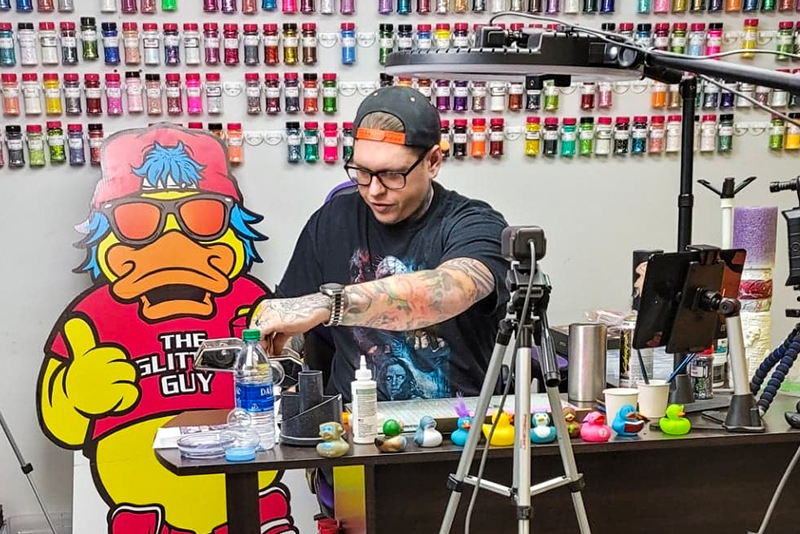
Jason Lively prepares for a video shoot.
“We try to inspire more people to try new crafts, through live video on our social media,” said Jason, who helps the business broadcast tutorials, new product releases, upcoming events and sales, and virtual hangout sessions to craft and chat with customers. He and Sara also run two Facebook groups: “Tumbler Hacks 101,” with over 95,000 members, and “The Glitter Guy,” with over 50,000 members. In both, members share creations, ask for opinions or recommendations on products, and share tips for making the most out of glittery crafts, including how to find inspiration to beat “crafters-block.”
One thing has stood out in the Facebook groups since the pandemic started: an increase in posts from new members asking for beginner-level advice. “Crafting is a great creative outlet for releasing emotions, which can be extremely helpful to anyone feeling down or lonely in these troubling times,” he said.
Embroidering office jargon into chic apparel
With the transition to working from home, Aysegul Conboy, an interior designer, found she was spending too much time in front of a computer. “I was answering emails in the middle of the night and attending endless video calls,” she said.

Aysegul Conboy opened her own crafty small business, Out of Office Brand, during the pandemic.
With lines between work and life increasingly blurred, Aysegul found she couldn’t help but laugh at some of the conventions of office-speak. “At first, I was frustrated at the emails ending with ‘friendly reminder’ that are never friendly,” she said, “but then it started to make me giggle.” She wondered if others were experiencing the same thing.
Looking to take up a screen-free activity, Aysegul ordered an embroidery machine and decided to start embroidering some of her favorite work jargon onto sweatshirts.
“I wanted to create something that I could see myself using – something that is humorous but subtle and minimal,” she said.
Aysegul started wearing her sweatshirts to video meetings. Soon, friends and coworkers began asking where they could get one for themselves, and Aysegul realized she could turn her pandemic hobby into a full-fledged business. She founded Out of Office Brand, which she calls “clothing with a weekend attitude, made for the entire week.”

Aysegul models one of her sweatshirts, with “unsubscribe” embroidered on the front of it.
To build the business, she started an Instagram account and a website that's made it easy for customers to order and pay for the sweatshirts using PayPal Checkout. “PayPal is one of the only payment methods that is user friendly, trustworthy and easy to use. It’s been a great tool for me and my business, because when it comes to online shopping, customers love to see options that are convenient, easy to use on their phones and trustworthy,” she said.
She’s not alone in her fondness for office speak. “I’ve had several people reach out with their own favorite email phrases,” she said. As Out of Office Brand continues to grow, Aysegul encourages other pandemic hobbyists and crafters to consider starting their own business: “It’s nice to have an outlet, to escape from our computers for a little bit and start something.”
Making that leap and starting a business can be a daunting proposition, especially during the uncertainty around the pandemic, but these business owners are grateful for the support they’ve received from customers and from PayPal.
“I’m beyond pleased [people are] supporting small businesses now more than ever,” said Jason from The Glitter Guy. “We’re thankful to PayPal for continuing to give us the opportunity to grow into the business we strive to be.”
1 The Lender for PayPal Working Capital in the United States is WebBank, Member FDIC